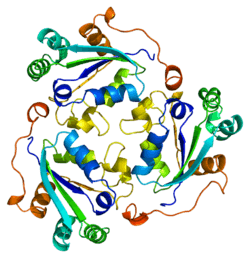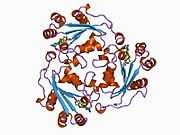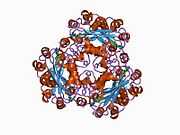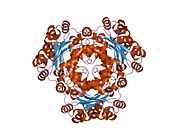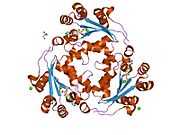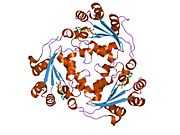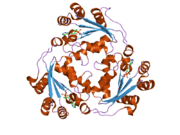NME1
Nucleoside diphosphate kinase A is an enzyme that in humans is encoded by the NME1 gene.[1] It is thought to be a metastasis suppressor.
Function
This gene (NME1) was identified because of its reduced mRNA transcript levels in highly metastatic cells. Nucleoside diphosphate kinase (NDK) exists as a hexamer composed of 'A' (encoded by this gene) and 'B' (encoded by NME2) isoforms. Mutations in this gene have been identified in aggressive neuroblastomas. Two transcript variants encoding different isoforms have been found for this gene. Co-transcription of this gene and the neighboring downstream gene (NME2) generates naturally-occurring transcripts (NME1-NME2), which encodes a fusion protein consisting of sequence sharing identity with each individual gene product.[2]
Interactions
NME1 has been shown to interact with:
See also
References
- ↑ Dooley S, Seib T, Engel M, Theisinger B, Janz H, Piontek K et al. (February 1994). "Isolation and characterization of the human genomic locus coding for the putative metastasis control gene nm23-H1". Hum. Genet. 93 (1): 63–6. doi:10.1007/bf00218915. PMID 8270257.
- ↑ "Entrez Gene: NME1 non-metastatic cells 1, protein (NM23A) expressed in".
- ↑ Du J, Hannon GJ (December 2002). "The centrosomal kinase Aurora-A/STK15 interacts with a putative tumor suppressor NM23-H1". Nucleic Acids Res. 30 (24): 5465–75. doi:10.1093/nar/gkf678. PMC 140054. PMID 12490715.
- ↑ Fournier HN, Dupé-Manet S, Bouvard D, Lacombe ML, Marie C, Block MR et al. (June 2002). "Integrin cytoplasmic domain-associated protein 1alpha (ICAP-1alpha ) interacts directly with the metastasis suppressor nm23-H2, and both proteins are targeted to newly formed cell adhesion sites upon integrin engagement". J. Biol. Chem. 277 (23): 20895–902. doi:10.1074/jbc.M200200200. PMID 11919189. Vancouver style error (help)
- ↑ Rual JF, Venkatesan K, Hao T, Hirozane-Kishikawa T, Dricot A, Li N et al. (October 2005). "Towards a proteome-scale map of the human protein-protein interaction network". Nature 437 (7062): 1173–8. doi:10.1038/nature04209. PMID 16189514.
- ↑ Negroni A, Venturelli D, Tanno B, Amendola R, Ransac S, Cesi V et al. (September 2000). "Neuroblastoma specific effects of DR-nm23 and its mutant forms on differentiation and apoptosis". Cell Death Differ. 7 (9): 843–50. doi:10.1038/sj.cdd.4400720. PMID 11042679.
- ↑ Chakravarti D, Hong R (March 2003). "SET-ting the stage for life and death". Cell 112 (5): 589–91. doi:10.1016/s0092-8674(03)00151-x. PMID 12628178.
- ↑ 8.0 8.1 Paravicini G, Steinmayr M, André E, Becker-André M (October 1996). "The metastasis suppressor candidate nucleotide diphosphate kinase NM23 specifically interacts with members of the ROR/RZR nuclear orphan receptor subfamily". Biochem. Biophys. Res. Commun. 227 (1): 82–7. doi:10.1006/bbrc.1996.1471. PMID 8858107. Vancouver style error (help)
- ↑ Nosaka K, Kawahara M, Masuda M, Satomi Y, Nishino H (February 1998). "Association of nucleoside diphosphate kinase nm23-H2 with human telomeres". Biochem. Biophys. Res. Commun. 243 (2): 342–8. doi:10.1006/bbrc.1997.8097. PMID 9480811.
Further reading
- Freije JM, MacDonald NJ, Steeg PS (1998). "Nm23 and tumour metastasis: basic and translational advances". Biochem. Soc. Symp. 63: 261–71. PMID 9513729.
- Roymans D, Willems R, Van Blockstaele DR, Slegers H (2002). "Nucleoside diphosphate kinase (NDPK/NM23) and the waltz with multiple partners: possible consequences in tumor metastasis". Clin. Exp. Metastasis 19 (6): 465–76. doi:10.1023/A:1020396722860. PMID 12405283.
- Tee YT, Chen GD, Lin LY, Ko JL, Wang PH (2006). "Nm23-H1: a metastasis-associated gene". Taiwan J Obstet Gynecol 45 (2): 107–13. doi:10.1016/S1028-4559(09)60206-0. PMID 17197349.
- Gilles AM, Presecan E, Vonica A, Lascu I (1991). "Nucleoside diphosphate kinase from human erythrocytes. Structural characterization of the two polypeptide chains responsible for heterogeneity of the hexameric enzyme". J. Biol. Chem. 266 (14): 8784–9. PMID 1851158.
- Leone A, McBride OW, Weston A, Wang MG, Anglard P, Cropp CS et al. (1991). "Somatic allelic deletion of nm23 in human cancer". Cancer Res. 51 (9): 2490–3. PMID 2015608.
- Hailat N, Keim DR, Melhem RF, Zhu XX, Eckerskorn C, Brodeur GM et al. (1991). "High levels of p19/nm23 protein in neuroblastoma are associated with advanced stage disease and with N-myc gene amplification". J. Clin. Invest. 88 (1): 341–5. doi:10.1172/JCI115299. PMC 296039. PMID 2056128.
- Rosengard AM, Krutzsch HC, Shearn A, Biggs JR, Barker E, Margulies IM et al. (1989). "Reduced Nm23/Awd protein in tumour metastasis and aberrant Drosophila development". Nature 342 (6246): 177–80. doi:10.1038/342177a0. PMID 2509941.
- Wang L, Patel U, Ghosh L, Chen HC, Banerjee S (1993). "Mutation in the nm23 gene is associated with metastasis in colorectal cancer". Cancer Res. 53 (4): 717–20. PMID 7916650.
- Chang CL, Zhu XX, Thoraval DH, Ungar D, Rawwas J, Hora N et al. (1994). "Nm23-H1 mutation in neuroblastoma". Nature 370 (6488): 335–6. doi:10.1038/370335a0. PMID 8047138.
- MacDonald NJ, De la Rosa A, Benedict MA, Freije JM, Krutsch H, Steeg PS (1993). "A serine phosphorylation of Nm23, and not its nucleoside diphosphate kinase activity, correlates with suppression of tumor metastatic potential". J. Biol. Chem. 268 (34): 25780–9. PMID 8245015.
- Postel EH, Berberich SJ, Flint SJ, Ferrone CA (1993). "Human c-myc transcription factor PuF identified as nm23-H2 nucleoside diphosphate kinase, a candidate suppressor of tumor metastasis". Science 261 (5120): 478–80. doi:10.1126/science.8392752. PMID 8392752.
- Sudbrak R, Golla A, Hogan K, Powers P, Gregg R, Du Chesne I et al. (1993). "Exclusion of malignant hyperthermia susceptibility (MHS) from a putative MHS2 locus on chromosome 17q and of the alpha 1, beta 1, and gamma subunits of the dihydropyridine receptor calcium channel as candidates for the molecular defect". Hum. Mol. Genet. 2 (7): 857–62. doi:10.1093/hmg/2.7.857. PMID 8395939.
- MacDonald NJ, Freije JM, Stracke ML, Manrow RE, Steeg PS (1996). "Site-directed mutagenesis of nm23-H1. Mutation of proline 96 or serine 120 abrogates its motility inhibitory activity upon transfection into human breast carcinoma cells". J. Biol. Chem. 271 (41): 25107–16. doi:10.1074/jbc.271.41.25107. PMID 8810265.
- Paravicini G, Steinmayr M, André E, Becker-André M (1996). "The metastasis suppressor candidate nucleotide diphosphate kinase NM23 specifically interacts with members of the ROR/RZR nuclear orphan receptor subfamily". Biochem. Biophys. Res. Commun. 227 (1): 82–7. doi:10.1006/bbrc.1996.1471. PMID 8858107. Vancouver style error (help)
- Nosaka K, Kawahara M, Masuda M, Satomi Y, Nishino H (1998). "Association of nucleoside diphosphate kinase nm23-H2 with human telomeres". Biochem. Biophys. Res. Commun. 243 (2): 342–8. doi:10.1006/bbrc.1997.8097. PMID 9480811.
- Schaertl S, Konrad M, Geeves MA (1998). "Substrate specificity of human nucleoside-diphosphate kinase revealed by transient kinetic analysis". J. Biol. Chem. 273 (10): 5662–9. doi:10.1074/jbc.273.10.5662. PMID 9488696.
- Willems R, Van Bockstaele DR, Lardon F, Lenjou M, Nijs G, Snoeck HW et al. (1998). "Decrease in nucleoside diphosphate kinase (NDPK/nm23) expression during hematopoietic maturation". J. Biol. Chem. 273 (22): 13663–8. doi:10.1074/jbc.273.22.13663. PMID 9593706.
- Manda R, Kohno T, Matsuno Y, Takenoshita S, Kuwano H, Yokota J (1999). "Identification of genes (SPON2 and C20orf2) differentially expressed between cancerous and noncancerous lung cells by mRNA differential display". Genomics 61 (1): 5–14. doi:10.1006/geno.1999.5939. PMID 10512675.
| |||||||||||||||||||
